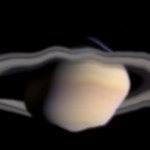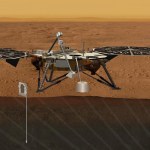Physical Sciences
That's the title of my slightly insane talk at the DAMOP (Division of Atomic, Molecular, and Optical Physics of the American Physical Society) conference a couple of weeks ago, summarizing current topics of interest in Atomic, Molecular, and Optical Physics. I'll re-embed the slides at the end of this post, for anyone who missed my earlier discussion.
I put a ton of work into that talk, and had a huge amount of material that I didn't have time to include. I'd hate for that to go to waste, so I'm going to repurpose it for blog content over the next week or so. It'll probably be about a half-…
It's grant crunch time, as the submission deadline for revised R01s is July 5. However, in a classic example of how electronic filing has actually made things more difficult, the grant has to be done and at the university grant office a week before the deadline if it is to be uploaded in time. So, my beloved Orac-philes, I'm afraid it's reruns today, but, benevolent blogger that I am, I'll post two, one older, one more recent, but both about the same topic. This one's from 2007, which means that if you haven't been reading at least four years it's new to you.
A common refrain among…
The other day, I expressed my displeasure at an article published in The Atlantic that, boiled down to its essence, was one long apologia for unscientific "complementary and alternative medicine" (CAM) and "integrative medicine" (IM). Yes, I was quite critical, but, I believe, not unfairly so. Not surprisingly, however, the author of the article, David H. Freedman, was quite displeased, so much so that he actually showed up in my comments to take me to task. He didn't just take me to task, though. He took all of you to task, as well, at least those of you who piled on. Unfortunately, his…
"He who loves practice without theory is like the sailor who boards ship without a rudder and compass and never knows where he may cast." -Leonardo Da Vinci
It's often lonely, these days, as a theorist. As soon as most people hear the word theory, in fact, they start thinking about something like this:
Image credit: F. Steiger.
But if you're scientifically minded, you know just how powerful your theory is. Because your theory - if it's any good - allows you to not only explain what you've already seen, but allows you to predict something new, which you can then go look for.
By the early…
Remember Deepak Chopra?
He's the physician (yes, physician) whose grasp on real science is so tenuous and whose ability to abuse multiple scientific disciplines, ranging from quantum physics to astronomy to genetics to medicine, simultaneously in the service of woo is so amazing that a few years ago I once coined a term representing the only word you ever need to use to refer to Chopra's blather: Choprawoo. Yes, I realize that the term "Choprawoo" is completely redundant if you're a skeptic and realize just how full of pseudoscientific nonsense Chopra's blather is. On the other hand, for the…
"All things move and nothing remains still" -- Heraclitus
The history of astronomy can be read as a story of better and better vision. Over the centuries, we have supplemented our vision with technology that allows us to see further and more clearly; while Ancient astronomers, who relied only on their naked eyes to perceive the universe, managed to make star catalogues and predict comets, Galileo, pressing his to a telescope, saw all the way to the moons of Jupiter.
Optical telescopes and the human eye are fundamentally limited; early astronomers were forced to gaze into telescopes for…
Right around the time I sent in the manuscript for my own book explaining relativity to Emmy, I got an email offering me a review copy of The Manga Guide to Relativity, part of a series of English translations of Japanese comic books explaining complicated concepts in a friendly way. That was clearly too good a wind-down read to pass up.
Like other books in the series, this sets up a manga-type plot that just happens to require introducing relativity. In this case, on the last day of school at Taigai Academy, headmaster Rase Iyaga makes a surprise announcement: that he will throw a dart at…
A few years ago, we switched to the Matter & Interactions curriculum for our introductory classes. This has not been without its hiccups, among them the fact that there has been a small decline in the conceptual learning gains measured by the Force Concept Inventory, the oldest and most widely used of the conceptual tests favored by the Physics Education Research community. We've spent some time discussing whether this is a temporary glitch, due to the transition, or something inherent in the curriculum. (Our numbers are small enough that these results remain at the level of plural…
British teenage students have re-discovered a classical physical phenomenon, the Leidenfrost effect that could someday help ships glide through oceans more efficiently.
I'll let these 16 year old students explain it:
One day in Physics class we accidentally discovered you could get beautiful standing wave patterns on a drop of water on a very hot plate. This film gives an introduction to the wonderful Leidenfrost Effect.
The film was made by 16 students (aged around 16) - only three appear in the film, but everyone helped, as did their physics teacher. You can watch the video here.
Below I…
"It is no good getting furious if you get stuck. What I do is keep thinking about the problem but work on something else. Sometimes it is years before I see the way forward. In the case of information loss and black holes, it was 29 years." -Stephen Hawking
When we look out at the Universe, you know what it is that we see.
Image credit: Misti Mountain Observatory.
Light! Light from stars, galaxies, clusters, etc., covering all the different wavelengths you can measure.
But there weren't always stars, galaxies, and clusters in the Universe. When the Universe was first "born," in fact, the…
I've caught some flak before over things I've written about the almost certainly nonexistent link between cell phones and cancer. Actually, it's not the kind of flak you probably think, unless you've been a long time reader and remember the relevant posts. You'd think it would be believers attacking the mean old skeptic for denying a link between cell phone radiation and cancer, thus making me (obviously) a shill for big telecom. Actually, it was flak from one physicist and at least a couple of skeptics, who didn't like that I actually left open the small possibility that it could be possible…
News: Major Decisions - Inside Higher Ed
"For 15 broad categories of majors, such as engineering, physical science, and business, the report explores the median and quartile pay, the percentage of the major comprising women and minorities, and the percentage of individuals from that major who went on to get graduate degrees. The report also breaks down those groups and explores similar data for 171 individual majors.
Some of the results are to be expected. Science, engineering, and business majors tend to be better-off financially than majors in liberal arts and humanities, education, and…
The anti-vaccine movement is a frequent topic on this blog, sometimes to the point where it seems to take over the blog for days (or even weeks) at a time and I cry for respite. There are a number of reasons for this, not the least of which being that the anti-vaccine movement is one of the most dangerous forms of pseudoscience, a form of quackery that, unlike most forms of quackery, endangers those who do not partake of it by breaking down herd immunity and paving the way for the resurgence of previously vanquished diseases. However, anti-vaccine beliefs share many other aspects with other…
Against Craft « Booklife
""Craft" today is not a counter to the Romantic vision of an artistic elite chosen by the Divine, it is a quasi-proletarian flinch often designed to protect one's work from being compared to art, thus protecting it (and one's ego) from its near-inevitable failure to stack up to the idea of art as a superlative. The craft metaphor also serves the production-driven processes of conglomerate publishing: books are published to fill slots and develop and extend categories on a mass scale, which militates against the individual nature of a piece of art. And yet, writers…
"If you want to build a ship, don't drum up people to collect wood and don't assign them tasks and work, but rather teach them to long for the endless immensity of the sea." -Antoine de Saint-Exupery
For me, personally, it isn't the endless immensity of the seas that calls. It's the endless immensity of space, the Universe, and the stars.
Image credit: NASA, ESA and A. Nota (STScI/ESA).
And I try to not just share my passion for it with my readers and students, but to encourage all of you (and all of them) to follow their passions. Perhaps it's physical science that excites you, like it…
Recently, there have been grumblings in the ranks of Orac-philes. All is not entirely well. Or, at least, all is less well than usual. Even more unusual, I feel your pain. I really do. We've been enduring a stretch when the anti-vaccine movement has been unusually busy for an unusually long time, leading vaccines to take over and dominate as the main topic of this blog for more than the last week. This has led not only to my getting tired of the topic, but to some of you apparently becoming tired as well of the sheer burning stupid that only the anti-vaccine movement can lay down with such…
"God does not play dice with the Universe." -Einstein
"Einstein, don't tell God what to do." -Neils Bohr (disputed, but awesome)
Einstein, the brilliant mind behind general relativity and the concept of "spacetime," is making the news again this week. As you all know, gravity isn't some mysterious invisible force traveling across space, it comes about because energy itself -- most commonly in the form of mass -- distorts the very fabric of space.
Image credit: GNU user Johnstone and NASA's Galileo spacecraft.
Of course, wrapping your head around this can prove quite difficult. Space, as we…
Today, NASA announced three future key missions preselected as part of the Discovery program named GEMS, TiME and Comet Hopper. This is an important announcement, which was eagerly expected by our community.
The NASA Discovery program is a low-cost mission ($425 million FY2010) program aimed at developing and supporting a well-defined and narrow-range science mission in the field of planetary exploration. Discovery is a dynamic and highly valuable program which had led to a lot of well-known missions with a wide range of scientific goals including (adapted from Visions & Voyages Decadal…
The Civil War Isn't Tragic - Ta-Nehisi Coates - National - The Atlantic
"Yesterday, Robert Zimmerman was kind enough to link this podcast on the Civil War, and the reasons soldiers, Union and Confederate, offered up for fighting. It's a good segment which I heartily recommend, especially for those of us in the Effete Liberal Book Club. That said, one thing struck me about the conversation, which inevitably comes through any time smart people gather to discuss the Civil War. The conceded common ground was the following--The Civil War was a tragedy.
I think that ground is generally…
With the utter ridiculousness of the arguments laid down by Dr. Oz when Steve Novella appeared on his show and the even more ridiculous silliness of J.B. Handley thinking that Matt Carey, a.k.a. Sullivan, is really Bonnie Offit, I had originally thought that I should find some peer-reviewed scientific article today to do a sober, serious analysis of some cool bit of science. Hey, it sounded like a good idea. Then I finished my day, which was my clinic day, and I was simply too tired to summon up the effort it would take to go through a paper, analyze it, and write up that analysis for the…







